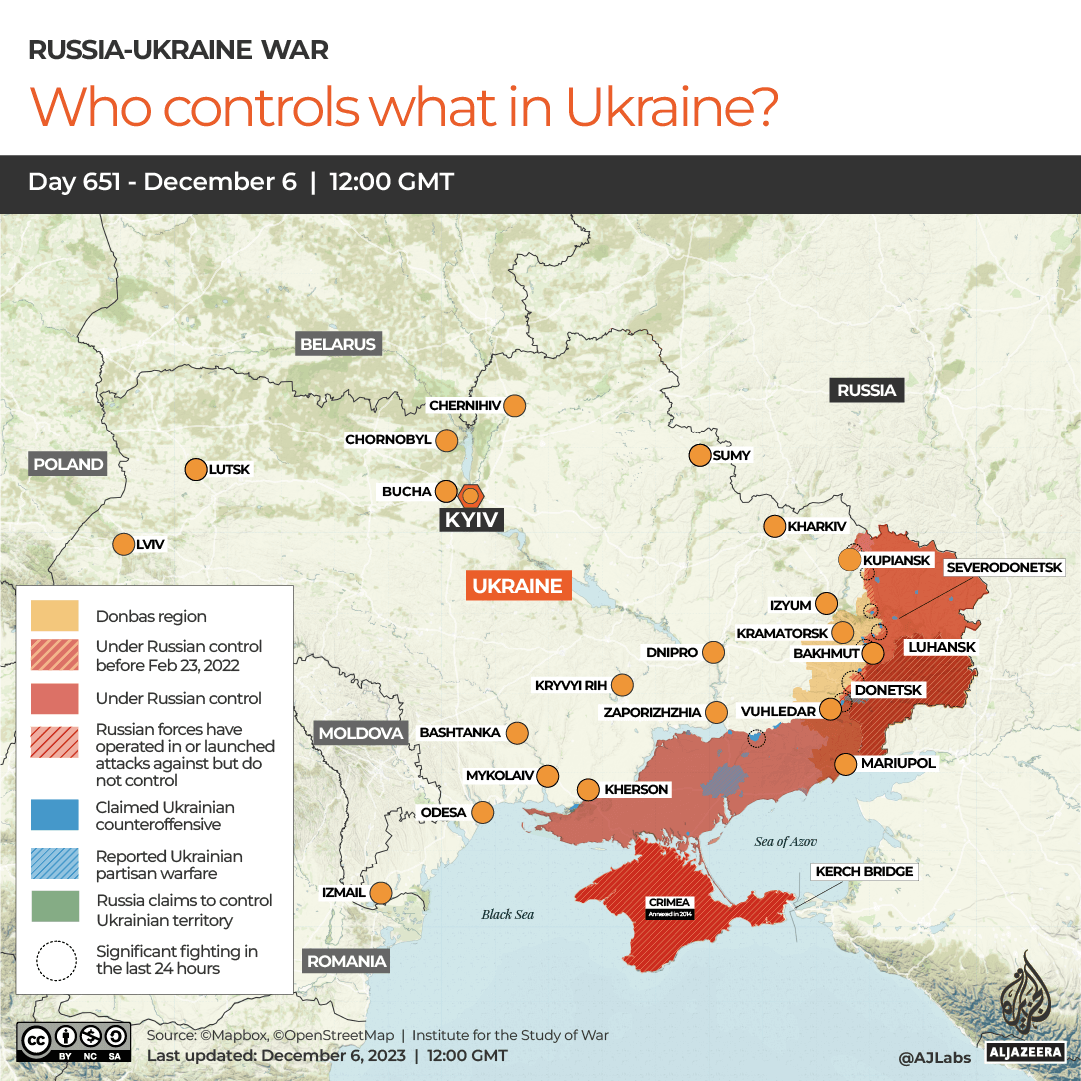
The past week of Russia’s war in Ukraine was remarkable, chiefly for something that happened thousands of kilometres to the east of a hardened battlefront.
In an apparent sabotage operation of breathtaking audacity, Ukrainian operatives blew up two freight trains in east Siberia travelling on a track believed to be used to shuttle North Korean-made ordnance to the Russian front lines in Ukraine.
Details were sketchy, but some facts have emerged.
A freight train caught fire in the 15km-long (9.3-mile) Severomuysky Tunnel in the Republic of Buryatia on the night of November 29, the East Siberian Transport Prosecutor’s office reported.
Ukrainian media cited intelligence sources as saying four explosive devices had been planted on the railway, one of two rail links between Russia and China, reportedly also used for ferrying ammunition.
“During the movement of the freight train, four explosive devices went off,” the Ukrainian intelligence source was quoted as saying.
“Now the [Russian Federal Security Service] FSB is working on the spot, railway workers are unsuccessfully trying to minimise the consequences of the SBU special operation,” the source said, referring to the Security Service of Ukraine by its acronym.
The train in question was believed to be carrying 44 cars of refined fuel. At least three were destroyed. A successful detonation might have disabled the tunnel, and that indeed appeared to be the goal of the saboteurs, who told Ukrainian media the route was “paralysed”.
On Thursday, the FSB arrested a Belarusian man it said planted the train explosives on behalf of Ukraine’s SBU.
Calling the incident a “terrorist act”, Moscow said the detained man’s handler was a Lithuania-based Belarusian linked to Ukraine’s secret services.
Russian media said “the explosion seriously damaged the rails, and the leaked fuel flooded them”.
Expecting trains to be rerouted through a northern pass of the Baikal-Amur track, the SBU apparently staged a second explosion on a second fuel train as it passed over a bridge in an unspecified location. Four fuel tanks were destroyed and another two were damaged.

Ukraine has every reason to disable Russia’s rail links with China. North Korea is believed to have sent Russia more than a million artillery shells to discharge in Ukraine.
Satellite images the Washington Post published on October 16 suggested that two Russian ships had successfully transported cargo from the North Korean free trade zone port of Rason to Russia’s port of Dunai several times since August.
From Dunai, the containers would most likely traverse the vast Russian landmass via rail.
A Washington Post analysis suggested shipments began in mid-August, and US National Security Council spokesperson John Kirby confirmed on October 13 that as many as 1,000 containers’ worth of North Korean weapons had reached Russia between September 7 and October 1.
Zelenskyy expects intense Russian air campaign
Ukraine was also continuing to focus on disrupting Russian supply routes in Crimea.
The Russian defence ministry said electronic warfare systems and air defences downed a total of 35 Ukrainian drones targeting the port of Feodosia in east Crimea on December 1.
“Apparently, the Ukrainian Armed Forces intended to hit the oil depot and power plant in the city,” said one Russian report. It was not clear if any drones struck their targets.
Russia launched more drones against Ukraine during the week – a total of 83 from November 30 to December 5. Ukraine’s air force said it downed 62 of them.

Ukrainian Air Force spokesman Yuriy Ignat said Russia had increased its own production of Iranian-designed Shahed drones, and they were likely to be Russia’s main weapon targeting Ukrainian energy infrastructure during winter.
Ukrainian President Volodymyr Zelenskyy also expected an intense Russian air campaign this winter targeting electricity and water utilities, he said in an interview with the AP.
Resources were one principal criterion for success in the war, resolve was the other, said Nigel Gould-Davies, chief Eurasia analyst for the International Institute for Strategic Studies (IISS), a London-based think tank.
He was speaking at the launch of the IISS’s flagship annual publication, the Armed Conflict Survey.
“The GDP [gross domestic product] of the West vastly exceeds Russia’s by a factor of 12,” said Gould-Davies.
“But … there are growing signs now, and more have appeared in the last few days, that… the West may be inferior in resolve. We have budget struggles in the [US] House [of Representatives] and now the [US] Senate and the EU is increasingly wrangling over budgetary support for Ukraine,” he said.

House and Senate Republicans have been insisting on tying military aid for Ukraine to strengthening border security with Mexico, and a socially conservative agenda.
Zelenskyy told the AP these tensions were frustrating, but he “can’t complain too much”.
“Look, we are not backing down, I am satisfied. We are fighting with the second (best) army in the world, I am satisfied,” he told the AP, referring to the Russian military.
He added: “We are losing people, I’m not satisfied. We didn’t get all the weapons we wanted, I can’t be satisfied, but I also can’t complain too much.”
But there were also signs of dissatisfaction in Russia.
A Russian opposition polling organisation, Chronicles, published a survey on November 30 suggesting that Russians who supported the war, opposed any withdrawal of troops before military aims had been achieved and supported heightened military spending had nearly halved during the year, from 22 percent to 12 percent.
A consistent 39-40 percent during 2023 supported a withdrawal of Russian troops from Ukraine without Russia achieving its war aims.








